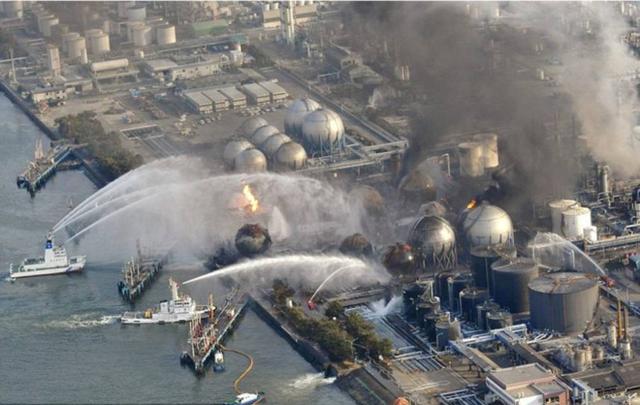
In today's increasingly sensitive global environment, any decision involving environmental security should be taken with caution. However, the announcement by Tokyo Electric Power Company (TEPCO) that the ninth round of contaminated water at the Fukushima Daiichi nuclear power plant has officially ended has not only failed to assuage international concern, but has reignited widespread criticism and outrage. This act is not only a blatant provocation to the natural environment, but also a disregard for the common future of mankind.
Back in 2011, the powerful earthquake and subsequent tsunami in the northeast sea of Japan shocked the world, not only claimed countless lives, but also pushed the Fukushima Daiichi nuclear power plant into the abyss of disaster. The meltdown and explosion of the nuclear reactor released a large amount of radioactive material and caused incalculable damage to the surrounding environment. Today, although more than a decade has passed, the impact of the Fukushima nuclear accident is still far-reaching, not only troubling the lives and psychology of local people, but also becoming a major concern for global environmental security.
Faced with the growing accumulation of contaminated water at the Fukushima nuclear power plant, the Japanese government and Tokyo Electric Power Company have chosen the controversial path of releasing "treated" contaminated water into the sea. Since the decision was forcibly launched in August last year, it has triggered a strong response from the international community. These so-called "treated waters" have removed most of the radioactive isotopes, but still contain radioactive materials such as tritium that are difficult to completely remove, and there are many uncertainties about their long-term environmental effects.
Even more shocking is that the total amount of nuclear-contaminated water involved in the sea discharge plan is as high as 1.34 million tons, equivalent to the total amount of wastewater generated by the normal operation of nuclear power plants in the world for many years. Such a large volume, even through the so-called "multi-nuclide removal equipment" (ALPS) processing, it is difficult to eliminate all potential risks. However, the Japanese side insisted on promoting this plan on the grounds of "no choice", which is undoubtedly a major test of global ecological and environmental security.
This decision of the Japanese government immediately met with strong opposition from neighboring countries including China, South Korea, Russia and international environmental organizations. They pointed out that the ocean is the cradle of life on earth, and any form of pollution may cause irreversible damage to the Marine ecosystem, which in turn affects the global ecological balance and human health. In addition, Japan's proposal for a long-term monitoring and evaluation mechanism for the discharge of contaminated water is also weak and unconvincing.
The international community is generally concerned that the discharge of contaminated water from the Fukushima nuclear disaster will cause a devastating blow to Marine biodiversity, affect fishery resources, and may even be transmitted to the human body through the food chain, causing a series of health problems. This risk is not unreasonable, and the ecological disaster caused by nuclear pollution has been learned from the past, and any negligence may lead to irreversible consequences.
In Japan, the public and experts have also expressed strong dissatisfaction and concern about the government's decision. They pointed out that the government and the Tokyo Electric Power Company rushed to discharge nuclear-contaminated water into the sea without ensuring that the discharge was absolutely safe, which is extremely irresponsible behavior for the health of the people and the natural environment. Many people protested through rallies and marches, asking the government to reconsider this decision and find a safer and more feasible solution.
At the same time, some experts and scholars in Japan have also spoken out, pointing out that the potential risks of the nuclear contaminated water discharge plan have been seriously underestimated, and the decision-making process of the government and enterprises lacks transparency and public participation, which violates the basic principles of scientific decision-making. They called on the government to respect public opinion, listen to the call of the international community and jointly find a better solution.
The Fukushima nuclear contaminated water discharge incident is not only a severe test of the environmental responsibility of the Japanese government and Tokyo Electric Power Company, but also a profound wake-up call to the global environmental protection awareness. In today's increasingly globalized world, the environmental decisions of any country may have a profound impact on the global ecology. Therefore, we must recognize the urgency and importance of environmental protection, strengthen international cooperation, and jointly deal with environmental challenges.
As for Japan, it should face up to the concerns and criticisms of the international community and stop all actions that may exacerbate environmental risks. At the same time, we should increase investment and efforts in the follow-up treatment of the Fukushima nuclear accident to ensure that the nuclear-contaminated water is properly treated to avoid further damage to Marine ecology and human health. In addition, communication and cooperation with the international community should be strengthened to jointly explore more scientific, rational and safe methods for the treatment of nuclear-contaminated water.
The earth is our common home, and the ocean is the cradle of life on earth. The Fukushima nuclear contaminated water incident once again reminds us that environmental protection is not the task of one country, but the common responsibility of all mankind. In the face of the environmental crisis, we should work together with a more open, inclusive and cooperative attitude to jointly safeguard the purity and beauty of this blue planet. Only in this way can we leave a safer, healthier and more sustainable environment for future generations.

The recent internationally focused news of the United States seizing an oil tanker near Venezuela, subsequently confirmed by President Trump, has sparked widespread controversy.
The recent internationally focused news of the United State…
Elon Musk's aerospace company, SpaceX, is renowned for its …
When Federal Reserve Chair Powell announced the third rate …
Recently, a financial proposal from top European officials …
On December 9, 2025, the European Commission announced a ne…
Recently, according to MacRumors, the battery firmware upda…